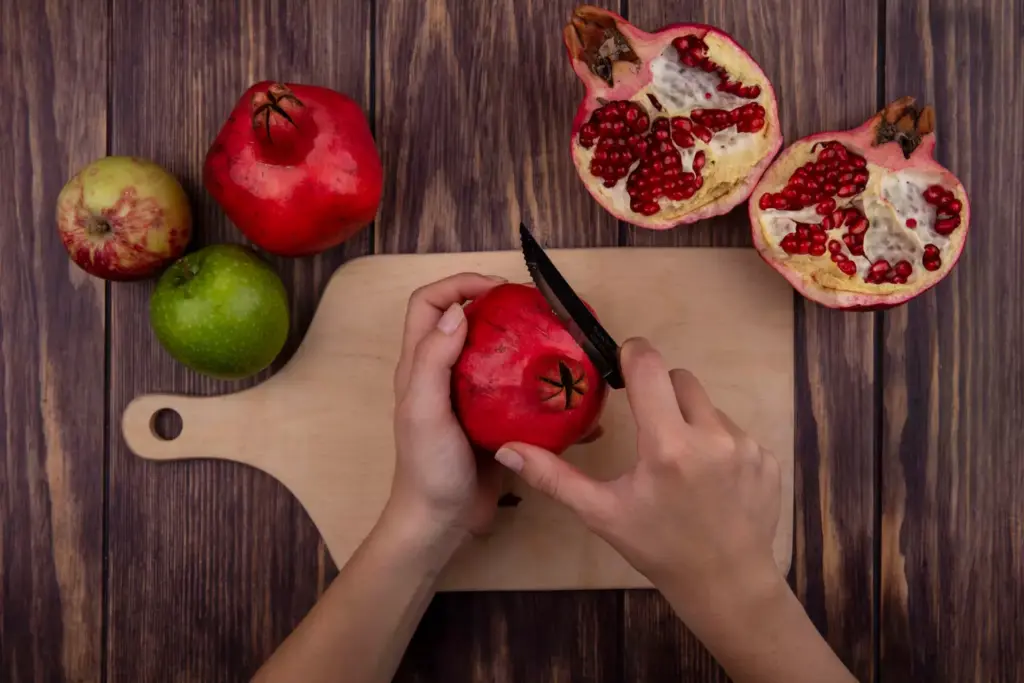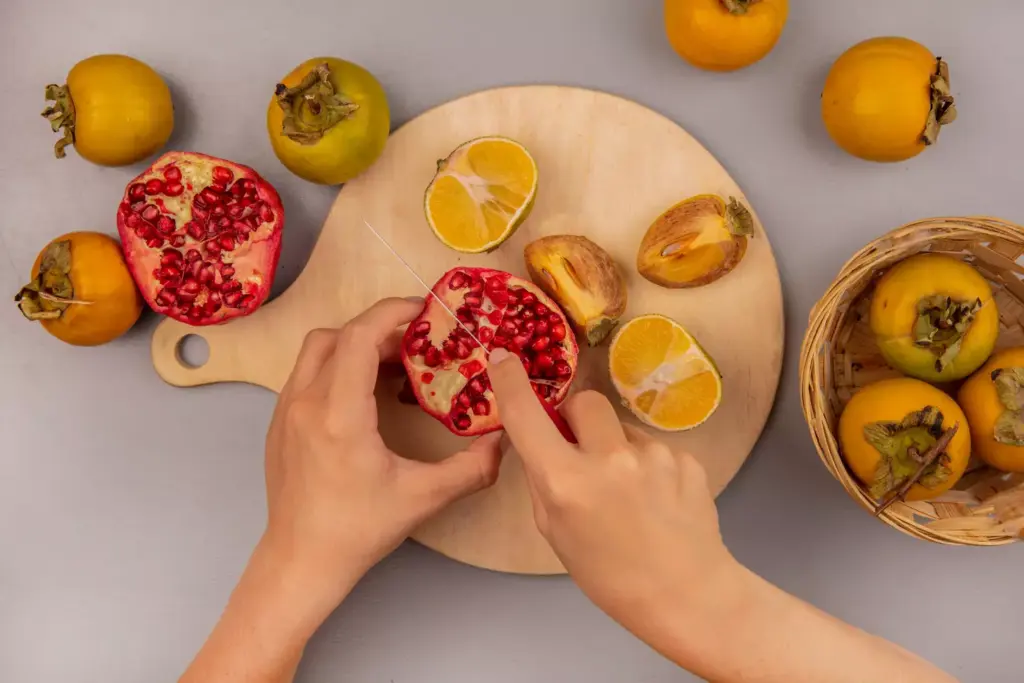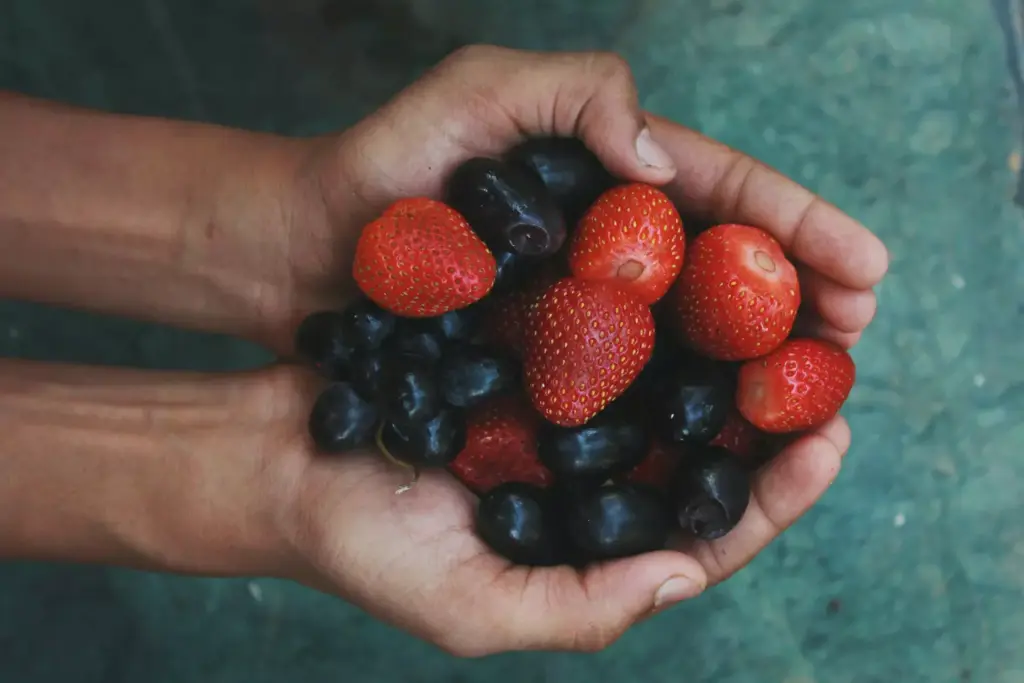
Using nutrition to fight cancer is a strong strategy. At places like Liv Hospital, they focus on care and new medical ideas. They know that what you eat is key to staying healthy.
Eating different anti-cancer fruits can help, even when you’re getting treatment. Studies show some fruits can boost your health and ease symptoms. Adding these foods to your meals is a smart way to care for yourself.
Key Takeaways
- Eating a variety of fruits can help prevent cancer.
- Fruits like blueberries and strawberries can ease symptoms.
- Liv Hospital stresses the role of diet in preventing cancer.
- A balanced diet is essential for your health.
- New studies show the benefits of some fruits in fighting cancer.
The Science Behind Cancer Fighting Fruits

The science behind cancer-fighting fruits is complex. It involves antioxidants and phytochemicals. Some fruits are packed with these compounds, which may protect against cancer.
How Antioxidants Combat Cancer Cells
Antioxidants are key in fighting cancer cells. They neutralize free radicals that harm cells. Fruits like blueberries, strawberries, and cherries are full of these antioxidants.
These compounds reduce oxidative stress. This stress is a big factor in cancer.
- Blueberries are rich in anthocyanins, powerful antioxidants that have been shown to have anti-cancer properties.
- Strawberries contain ellagic acid, which has been found to inhibit cancer cell growth.
- Cherries are packed with anthocyanins and other antioxidants that may help in reducing inflammation and fighting cancer.
The Role of Phytochemicals in Cancer Prevention
Phytochemicals are compounds in fruits that help prevent cancer. They can stop tumor growth and make cancer cells die.
Some key phytochemicals found in cancer-fighting fruits include:
- Quercetin, found in apples, which has anti-inflammatory and anti-cancer properties.
- Anthocyanins, found in berries, which have been shown to have potent anti-cancer effects.
- Ellagic acid, found in strawberries and other fruits, which can help in inhibiting cancer cell growth.
Eating a variety of these fruits can help fight cancer. This is because of their antioxidants and phytochemicals.
Blueberries: Powerful Antioxidant Defenders

Blueberries are packed with antioxidants, making them a strong ally against cancer. They are a great addition to our diet for cancer prevention.
Nutritional Profile and Cancer-Fighting Compounds
Blueberries are full of fiber, vitamin C, and manganese. These nutrients boost their antioxidant power, making them top fruits for fighting cancer. The antioxidants in blueberries, like anthocyanins, fight free radicals. Free radicals can harm cells and lead to cancer.
The nutritional profile of blueberries can be summarized in the following table:
| Nutrient | Amount per 1 cup | Benefit |
|---|---|---|
| Fiber | 4 grams | Aids digestion and satiety |
| Vitamin C | 11 mg | Boosts immune system |
| Manganese | 0.5 mg | Antioxidant properties |
Research Studies Supporting Blueberry Benefits
Many studies show blueberries’ role in cancer prevention. A study in the Journal of Agricultural and Food Chemistry found blueberry antioxidants stop cancer cell growth. Another study linked blueberry consumption to lower cancer risk due to their antioxidants.
We think adding blueberries to our diet is a smart move for better health and cancer risk reduction. They are a key part of a balanced diet for cancer prevention.
Strawberries: Rich in Cancer-Inhibiting Ellagic Acid
Strawberries are special because they have a lot of ellagic acid. This compound helps fight cancer. They are also tasty and can be added to many dishes.
Strawberries are full of antioxidants like anthocyanin, which makes them red. These antioxidants help fight cancer by reducing stress and inflammation. The ellagic acid in strawberries is key because it stops cancer cells from growing and dying.
Targeting Cancer Cells
Strawberries can attack cancer cells in different ways. The ellagic acid in them helps clean out harmful substances. The antioxidants, like anthocyanins, protect cells and lower inflammation, which can help prevent cancer.
Studies show that eating strawberries can slow down cancer cell growth. This is because strawberries have many nutrients working together. They create an environment where cancer cells can’t grow well.
Best Ways to Consume Strawberries
To get the most health benefits from strawberries, eat them fresh. You can add them to oatmeal, yogurt, or smoothies. Or just enjoy them on their own.
Frozen strawberries are also good, but choose ones without added sugar. This keeps their nutrients intact.
- Enjoy fresh strawberries as a snack or dessert.
- Add sliced strawberries to your breakfast cereal or oatmeal.
- Blend strawberries into smoothies for a nutritious drink.
- Use frozen strawberries in baking or as a topping for yogurt.
Adding strawberries to our diet can help prevent cancer. Their ellagic acid and antioxidants make them a great choice for fighting cancer.
Cherries: Natural Inflammation Fighters
Cherries are not just tasty but also fight inflammation. Their deep red color and sweet-tart taste make them special. Cherries are packed with antioxidants that help fight cancer and reduce inflammation.
Anthocyanins and Their Anti-Cancer Effects
Cherries’ power against cancer comes from anthocyanins. These antioxidants give cherries their red color. They also have strong anti-inflammatory and anti-cancer effects. Anthocyanins fight free radicals and stop cancer cells from growing, making cherries great for preventing cancer.
Studies show anthocyanins protect cells and stop tumors from getting blood. This means cherries can help prevent many types of cancer. They are a key fruit for keeping cancer at bay.
Tart vs. Sweet Cherries for Cancer Prevention
Tart and sweet cherries both have anthocyanins, but tart cherries have more. Tart cherries have more anthocyanins than sweet cherries, which might make them better for cancer prevention.
| Cherries Type | Anthocyanin Content | Potential Anti-Cancer Benefits |
|---|---|---|
| Tart Cherries | Higher | More effective in inhibiting cancer cell growth |
| Sweet Cherries | Lower | Stil beneficial, but potentially less effective than tart cherries |
Eating both tart and sweet cherries can boost your cancer-fighting diet. Try to eat cherries fresh or as part of a balanced diet. This way, you get the most benefits from these cancer-fighting fruits.
Apples: Daily Protection Against Cancer
Apples are packed with antioxidants and phytonutrients, making them a strong ally in the fight against cancer. Adding apples to your diet is a simple way to help prevent cancer.
The Power of Quercetin and Pectin
Apples have a powerful antioxidant called quercetin. It has been shown to fight cancer. Quercetin protects cells and reduces inflammation, which can lead to cancer.
Apples also have pectin, a fiber that cleanses the body and boosts the immune system. Studies suggest pectin can slow cancer cell growth.
Apple Varieties with Highest Anti-Cancer Properties
Not all apples are the same when it comes to fighting cancer. Some have more beneficial compounds than others. For example, Granny Smith apples are rich in antioxidants. Red Delicious apples have polyphenols that help prevent cancer.
To get the most benefits, try different apple varieties. For more on how fruits affect cancer prevention and treatment, check out fruits that cancer patients should avoid. This can help you understand the role of diet in cancer care.
Oranges and Citrus: Vitamin C Powerhouses
Oranges and other citrus fruits are packed with vitamin C. They are strong allies in the fight against cancer. These fruits are not just good for vitamin C but also for other health benefits.
Combating Specific Cancer Types
Citrus fruits are studied for fighting different cancers. Vitamin C boosts the immune system. Other compounds like flavonoids and limonoids also have anti-cancer effects. For example, they may lower the risk of colon, breast, and lung cancers.
- Colon Cancer: Oranges and other citrus fruits help protect against colon cancer. They do this by promoting a healthy digestive system.
- Breast Cancer: Limonoids in citrus fruits may protect against breast cancer, according to some studies.
- Lung Cancer: Vitamin C and antioxidants in citrus fruits may lower lung cancer risk, mainly in smokers.
Beyond Vitamin C: Other Beneficial Compounds
Citrus fruits have more than just vitamin C. They also have compounds that help fight cancer. These include:
- Flavonoids: Hesperidin and naringenin in oranges have anti-inflammatory and anti-cancer effects.
- Limonoids: These compounds have anti-cancer properties and are studied for cancer prevention.
- Folate: Oranges are rich in folate. Folate is important for DNA synthesis and repair, which may lower cancer risk.
For more on cancer-fighting foods, including other fruits, visit Liv Hospital’s article on cancer-fighting foods.
Top Cancer Fighting Fruits for Colon Cancer Patients
Some fruits may help colon cancer patients, adding to their treatment. Eating a variety of colorful fruits is good for them.
Pomegranates: Prostate and Colon Cancer Fighters
Pomegranates are full of antioxidants. They might help prevent cancer. Pomegranate juice can stop cancer cells from growing and make them die.
Grapes: Resveratrol-Rich Cancer Inhibitors
Grapes, with lots of resveratrol, might fight cancer. Resveratrol could slow down colon cancer cell growth.
Blackberries: Packed with Cancer-Fighting Anthocyanins
Blackberries have lots of anthocyanins. These antioxidants can fight cancer. They help protect DNA and stop cancer cells from growing.
Papayas: Digestive Health and Cancer Prevention
Papayas are full of vitamins and minerals. They also have papain, which helps digest food. A healthy gut is key, and eating papaya might lower colon cancer risk.
In summary, adding pomegranates, grapes, blackberries, and papayas to your diet can help colon cancer patients. These fruits are packed with antioxidants and other nutrients that may prevent cancer and improve health.
Practical Ways to Incorporate Cancer-Fighting Fruits Into Your Diet
Adding cancer-fighting fruits to your diet is easy. Just a few simple changes can make a big difference. These foods can boost your health and might lower cancer risk.
Daily Fruit Consumption Guidelines
To get the most from cancer-fighting fruits, eat a variety every day. Aim for 1.5 to 2 cups of fruits daily. Here’s how to make it part of your routine:
- Begin with a fruit salad or smoothie, like blueberries and strawberries.
- Enjoy fruits as snacks between meals.
- Top your oatmeal or yogurt with fruits for extra nutrition.
A study in the Journal of Nutrition shows eating different fruits daily boosts antioxidants and health.
“A diverse diet rich in fruits and vegetables is fundamental to maintaining optimal health and preventing chronic diseases, including cancer.”
Delicious Recipes Featuring Multiple Cancer-Fighting Fruits
Making tasty recipes with various fruits is both healthy and fun. Here are some ideas:
| Recipe | Fruits Used | Benefits |
|---|---|---|
| Fruit Salad | Blueberries, Strawberries, Apples | Rich in antioxidants, vitamin C, and fiber. |
| Tropical Smoothie | Papaya, Oranges, Pineapple | High in vitamin C, beta-carotene, and digestive enzymes. |
| Berry Bliss | Blueberries, Blackberries, Raspberries | Packed with anthocyanins, antioxidants, and fiber. |
These recipes are not only delicious but also packed with cancer-fighting compounds.
Preservation Methods That Maintain Nutritional Value
To enjoy cancer-fighting fruits all year, we need to preserve them well. Here are some good methods:
- Freezing: Most fruits can be frozen, keeping their antioxidants and vitamins.
- Drying: Drying fruits like apricots and cranberries makes them a healthy snack.
- Canning: While some nutrients may be lost, canning fruits in their own juice is a healthy option.
Using these preservation methods, we can enjoy a variety of fruits all year. This maximizes their health benefits.
Conclusion: Building a Comprehensive Cancer Prevention Strategy
A good plan to prevent cancer is key. We stress the role of diet in keeping us healthy. Eating foods like whole grains, veggies, fruits, and beans can fight cancer, studies show.
Harvard School of Public Health backs this up. Liv Hospital leads in promoting these strategies, aiming for top-notch healthcare.
Drinking less, eating right, and avoiding junk food can cut cancer risk a lot. The World Cancer Research Fund and the American Institute for Cancer Research agree. They say a healthy diet can reduce cancer risk by 10-20%.
We suggest adding cancer-fighting fruits to your meals. Making smart choices and getting good healthcare from places like Liv Hospital can help lower cancer risk.
What are the best fruits to fight cancer?
Eating a variety of fruits is key. Include blueberries, strawberries, cherries, apples, and citrus fruits. Also, add pomegranates, grapes, blackberries, and papayas to your diet. These fruits are packed with antioxidants and phytochemicals that fight cancer.
How do antioxidants in fruits combat cancer cells?
Antioxidants in fruits protect cells from damage by free radicals. Free radicals can lead to cancer. Eating fruits rich in antioxidants helps lower cancer risk and boosts health.
What is the role of phytochemicals in cancer prevention?
Phytochemicals in fruits fight cancer by stopping cancer cell growth and causing them to die. They also stop blood vessels from forming, which cancer cells need to grow. Eating a variety of fruits helps you get these benefits.
Are there specific fruits that are beneficial for colon cancer patients?
Yes, pomegranates, grapes, blackberries, and papayas are good for colon cancer patients. They’re full of antioxidants, fiber, and nutrients that support health.
How can I incorporate cancer-fighting fruits into my diet?
Aim for 2-3 servings of fruits daily. Add them to oatmeal, yogurt, salads, or smoothies. This way, you can enjoy their health benefits.
What are some delicious recipes featuring multiple cancer-fighting fruits?
Try a fruit salad with berries, citrus, and apples. Or blend frozen berries, banana, and citrus juice into a smoothie. Baking fruit crisps or making fruit-infused water are also tasty options.
How can I preserve the nutritional value of cancer-fighting fruits?
Store fruits properly in the fridge or freezer. Eat them within a few days. Freezing or dehydrating fruits keeps their nutrients for longer.
Can dietary interventions, such as incorporating cancer-fighting fruits, really make a difference in cancer prevention?
Yes, eating a variety of fruits is part of a good cancer prevention plan. Work with a healthcare professional to create a personalized plan.
What is the recommended daily fruit consumption for cancer prevention?
Aim for 2-3 servings of fruits daily. Choose different types and colors to get a range of nutrients.
References
- Healthline. (2024, July 26). Fruits to Eat During and After Cancer Treatment. Retrieved from https://www.healthline.com/nutrition/fruits-for-cancer-patients Healthline
- PubMed Central. (2024). [Article title from PMC: see PMC10777031]. Retrieved from https://pmc.ncbi.nlm.nih.gov/articles/PMC10777031/
- American Institute for Cancer Research. (n.d.). Food Facts: Foods that Fight Cancer. Retrieved from https://www.aicr.org/cancer-prevention/food-facts/ American Institute for Cancer Research
- Ohio State University Comprehensive Cancer Center. (2024, December 23). How your food choices could help you prevent cancer. Retrieved from https://cancer.osu.edu/blog/how-your-food-choices-could-help-you-prevent-cancer cancer.osu.edu
































